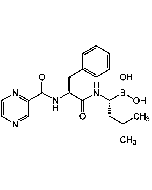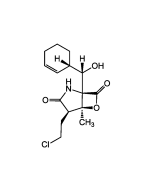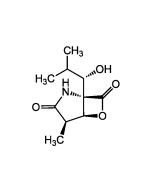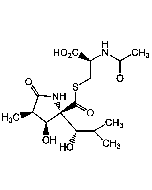Cookie Policy: This site uses cookies to improve your experience. You can find out more about our use of cookies in our Privacy Policy. By continuing to browse this site you agree to our use of cookies.
AdipoGen Life Sciences
ONX 0914
As low as
70
CHF
CHF 70.00
In stock
Only %1 left
AG-CR1-3674-M0011 mgCHF 70.00
AG-CR1-3674-M0055 mgCHF 210.00
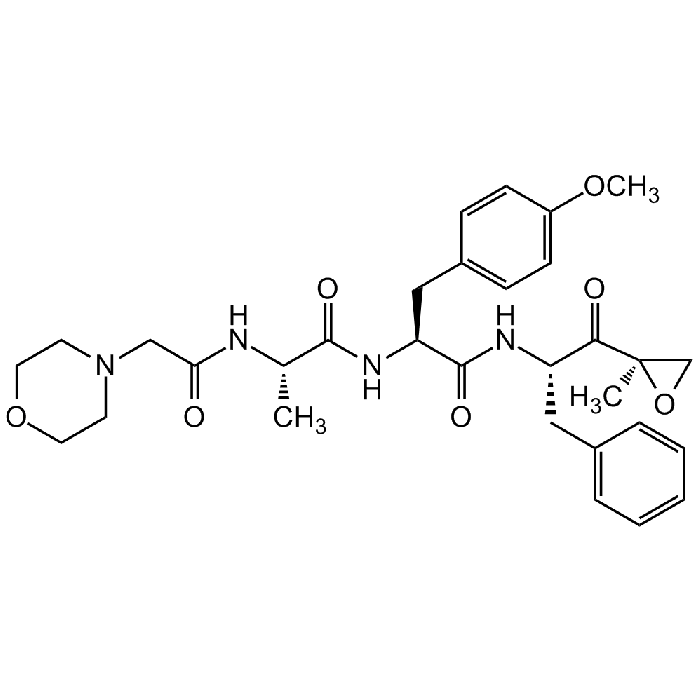
| Product Details | |
|---|---|
| Synonyms | N-[2-(4-Morpholinyl)acetyl]-L-alanyl-O-methyl-N-[(1S)-2-[(2R)-2-methyl-2-oxiranyl]-2-oxo-1-(phenylmethyl)ethyl]-L-tyrosinamide; PR-957 |
| Product Type | Chemical |
| Properties | |
| Formula |
C31H40N4O7 |
| MW | 580.7 |
| CAS | 960374-59-8 |
| Purity Chemicals | ≥98% |
| Appearance | White solid. |
| Solubility | Soluble in DMSO (30mg/ml), ethanol (20mg/ml) or DMF. Poorly soluble in aqueous solutions. |
| Other Product Data |
Note: Warming and sonication may be required when dissolving the compound in the solvent of choice. |
| InChi Key | WQAVPPWWLLVGFK-VTNASVEKSA-N |
| Smiles | O=C(N[C@@H](C)C(N[C@@H](CC1=CC=C(OC)C=C1)C(N[C@@H](CC2=CC=CC=C2)C([C@]3(C)OC3)=O)=O)=O)CN4CCOCC4 |
| Shipping and Handling | |
| Shipping | AMBIENT |
| Short Term Storage | +4°C |
| Long Term Storage | -20°C |
| Handling Advice | Keep cool and dry. |
| Use/Stability | Stable for at least 2 years after receipt when stored at -20°C. |
| Documents | |
| MSDS |
 Download PDF Download PDF |
| Product Specification Sheet | |
| Datasheet |
 Download PDF Download PDF |
Description
- Potent and selective 20S immunoproteasome inhibitor.
- Targets the β5i subunit [LMP7] of the 20S immunoproteasome (IC50=73nM) and with minimal cross-reactivity to the chymotrypsin-like β5 subunit of the constitutive 20S proteasome (IC50=1.04µM).
- Potent anti-inflammatory and anticancer agent. Inhibits production of pro-inflammatory cytokines and can induce apoptosis in vitro.
- Inhibits presentation of LMP7-specific, MHC-I-restricted antigens in vitro and in vivo, which consequently blocks production of interleukin-23 (IL-23) by activated monocytes and IFN-γ and IL-2 by T cells. Can also inhibit IL-17-producing T cells under TH17-polarizing conditions in vitro and reduce TH1 and TH17 cell differentiation in vivo.
- Shown to attenuate disease progression in several experimental models of autoimmune disorders, such as rheumatoid arthritis, inflammatory bowel disease and lupus, as well as in some hematologic malignancies and other cancer types.
Product References
- A selective inhibitor of the immunoproteasome subunit LMP7 blocks cytokine production and attenuates progression of experimental arthritis: T. Muchamuel, et al.; Nat. Med. 15, 781 (2009)
- Prevention of experimental colitis by a selective inhibitor of the immunoproteasome: M. Basler, et al.; J. Immunol. 185, 634 (2010)
- Immunoproteasome-specific inhibitors and their application: M. Basler & M. Groettrup; Methods Mol. Biol. 832, 391 (2012)
- Prophylactic and therapeutic efficacies of a selective inhibitor of the immunoproteasome for Hashimoto's thyroiditis, but not for Graves' hyperthyroidism, in mice: Y. Nagayama, et al.; Clin. Exp. Immunol. 168, 268 (2012)
- Immunoproteasome subunit LMP7 deficiency and inhibition suppresses Th1 and Th17 but enhances regulatory T cell differentiation: K.W. Kalim, et al.; J. Immunol. 189, 4182 (2012)
- Inhibition of the immunoproteasome ameliorates experimental autoimmune encephalomyelitis: M. Basler, et al.; EMBO Mol. Med. 6, 226 (2014)
- Interferon-γ-induced upregulation of immunoproteasome subunit assembly overcomes bortezomib resistance in human hematological cell lines: D. Niewerth, et al.; J. Hematol. Oncol. 7, 7 (2014)
- Bortezomib-resistant mutant proteasomes: structural and biochemical evaluation with carfilzomib and ONX 0914: E.M. Huber, et al.; Structure 23, 407 (2015)
- Inhibition of the Immunoproteasome Subunit LMP7 with ONX 0914 Ameliorates Graft-versus-Host Disease in an MHC-Matched Minor Histocompatibility Antigen-Disparate Murine Model: J. Zilberberg, et al.; Biol. Blood Marrow Transplant 21, 1555 (2015)
- PR-957, a selective inhibitor of immunoproteasome subunit low-MW polypeptide 7, attenuates experimental autoimmune neuritis by suppressing Th17-cell differentiation and regulating cytokine production: H. Liu, et al.; FASEB J. 31, 1756 (2017)
- Inhibition and deficiency of the immunoproteasome subunit LMP7 suppress the development and progression of colorectal carcinoma in mice: J. Koerner, et al.; Oncotarget (Epub ahead of print) (2017)






![VR23 [Proteasome Inhibitor]](https://adipogen.com/media/catalog/product/cache/60eb5af712bc93baae8d55513bd31b01/a/g/ag-cr1-3676.png)
![PI-1840 [Proteasome Inhibitor]](https://adipogen.com/media/catalog/product/cache/60eb5af712bc93baae8d55513bd31b01/a/g/ag-cr1-3675.png)
![Delanzomib [CEP-18770]](https://adipogen.com/media/catalog/product/cache/60eb5af712bc93baae8d55513bd31b01/a/g/ag-cr1-3673.png)
![Oprozomib [ONX 0912]](https://adipogen.com/media/catalog/product/cache/60eb5af712bc93baae8d55513bd31b01/a/g/ag-cr1-3672.png)
![Ixazomib citrate [MLN9708]](https://adipogen.com/media/catalog/product/cache/60eb5af712bc93baae8d55513bd31b01/a/g/ag-cr1-3671.png)
![Ixazomib [MLN2238]](https://adipogen.com/media/catalog/product/cache/60eb5af712bc93baae8d55513bd31b01/a/g/ag-cr1-3670.png)
![Carfilzomib [PR-171]](https://adipogen.com/media/catalog/product/cache/60eb5af712bc93baae8d55513bd31b01/a/g/ag-cr1-3669.png)
